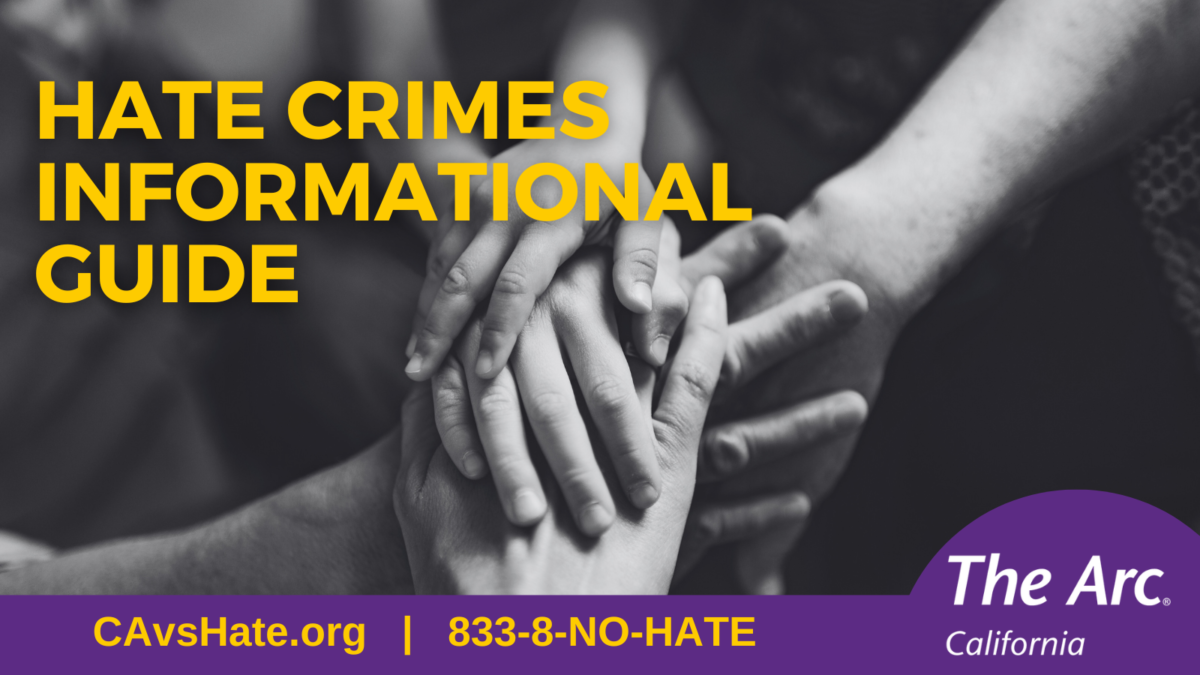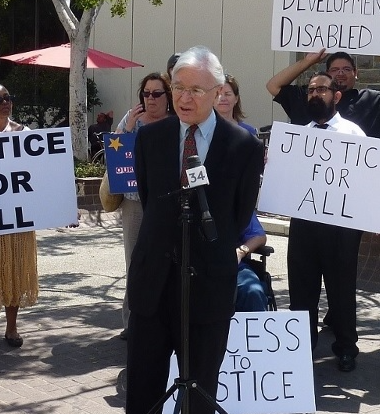Twenty-two civil rights groups led by The Arc are asking the state for strong, concrete actions to protect Californians from hate crimes — with particular attention to anti-disability crimes, known as the invisible hate crimes.
The groups last week wrote Attorney General Xavier Becerra and the Commission on Peace Officer Standards and Training (POST) spelling out specific, detailed steps the state should take to focus law enforcement agencies on hate crimes –- including everything we believe the state can do without difficult-to-pass further legislation.
The letters support and go beyond requests that 23 legislators made to Becerra on May 1.
One key request from both the legislators and the civil rights groups is to have all law enforcement agencies adopt formal policies guiding their officers’ enforcement of California’s hate crime laws. The policies, which some agencies already have adopted, are to include these sections, crucial to recognizing and prosecuting anti-disability hate crimes:
“’Bias motivation’ [which makes a criminal act a hate crime with added jail or prison time] is a preexisting negative attitude toward actual or perceived characteristics referenced in [Penal Code] Section 422.55. [Disability is the first protected characteristic listed in that section, which goes on to include gender, nationality, race or ethnicity, religion, sexual orientation, and association with persons with one or more of those characteristics.]
“Depending on the circumstances of each case, bias motivation may include, but is not limited to, hatred, animosity, resentment, revulsion, contempt, unreasonable fear, paranoia, callousness, thrill-seeking, desire for social dominance, desire for social bonding with those of one’s ‘own kind,’ or a perception of the vulnerability of the victim due to the victim being perceived as being weak, worthless, or fair game because of a protected characteristic, including, but not limited to, disability or gender.
“In recognizing suspected disability-bias hate crimes, the policy shall advise officers to consider whether there is any indication that the perpetrator was motivated by hostility or other bias, occasioned by factors such as, but not limited to, dislike of persons who arouse fear or guilt, a perception that persons with disabilities are inferior and therefore ‘deserving victims,’ a fear of persons whose visible traits are perceived as being disturbing to others, or resentment of those who need, demand, or receive alternative educational, physical, or social accommodations.
“In recognizing suspected disability-bias hate crimes, the policy also shall advise officers to consider whether there is any indication that the perpetrator perceived the victim to be vulnerable and, if so, if this perception is grounded, in whole or in part, in anti-disability bias. This includes, but is not limited to, if a perpetrator targets a person with a particular perceived disability while avoiding other vulnerable-appearing persons such as inebriated persons or persons with perceived disabilities different than those of the victim, those circumstances could be evidence that the perpetrator’s motivations included bias against persons with the perceived disability of the victim and that the crime must be reported as a suspected hate crime and not a mere crime of opportunity.
“Information regarding the general underreporting of hate crimes and the more extreme underreporting of anti-disability and anti-gender hate crimes and a plan for the agency to remedy this underreporting.”
This language is straight out of a 2018 bill: http://leginfo.legislature.ca.gov/faces/billNavClient.xhtml?bill_id=201720180AB1985 sponsored by The Arc and Equality California and carried by Assembly Member Philip Ting, the only hate-crime bill we’ve been able to pass since the start to of five-year nationwide hate crime wave in 2015.
Based on that successful bill, POST developed a model hate crimes policy: https://post.ca.gov/Portals/0/post_docs/publications/Hate_Crimes.pdf that the legislators and civil rights groups want all law enforcement agencies to adopt.




